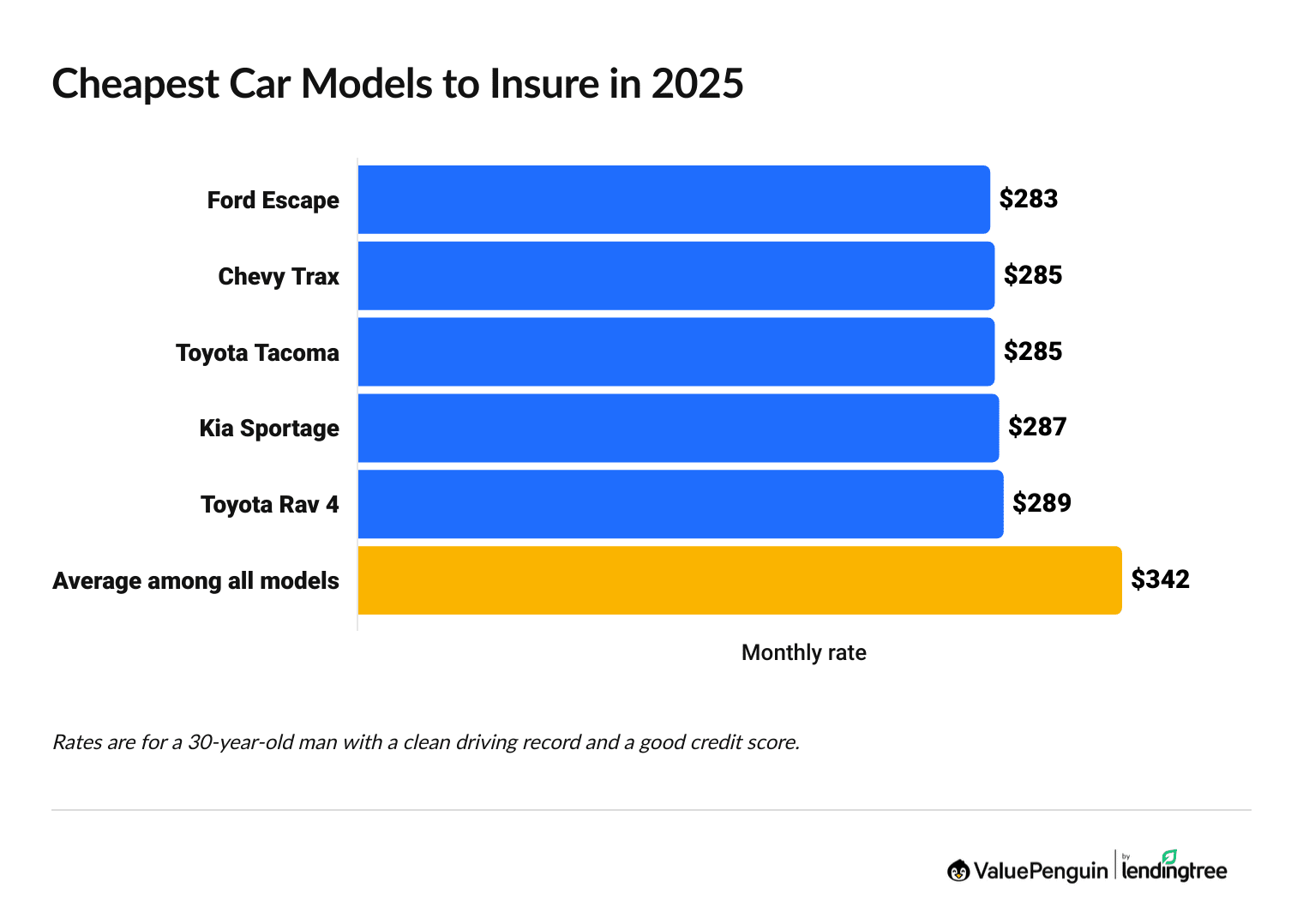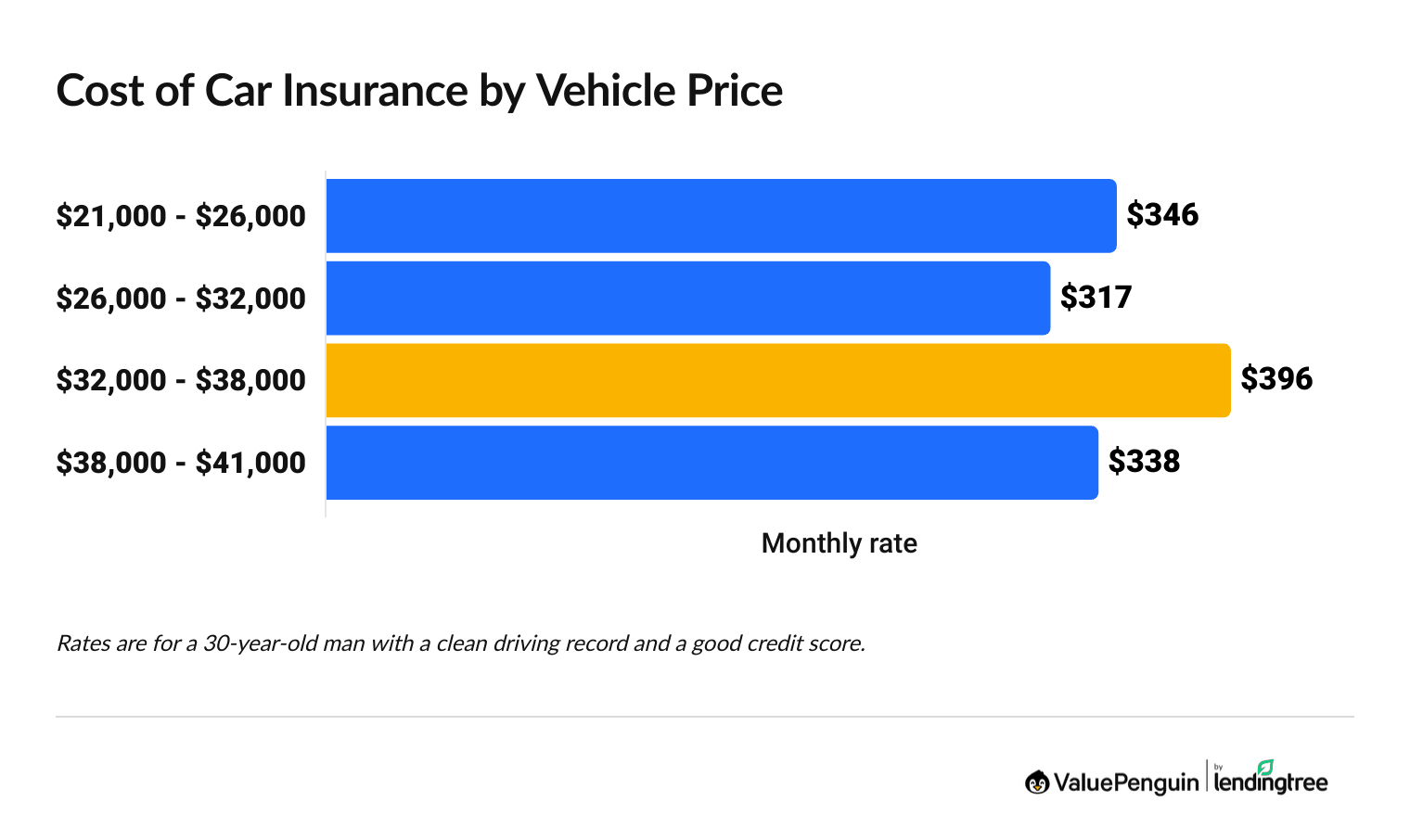The Cheapest Cars to Insure in 2025
The Honda CR-V and Mazda CX-5 are the cheapest cars to insure, on average.
Find Cheap Auto Insurance Quotes in Your Area
In general, smaller pickups and small SUVs cost less to cover than electric cars and full-size SUVs and trucks. Insurance for larger sedans — like the Honda Accord or Toyota Camry — and SUVs typically costs the most.
Car insurance rates are higher for certain cars for different reasons. A car with expensive repairs, a poor safety record or few anti-theft features will likely cost more to cover.
What's the cheapest car to insure?
The Ford Escape is the cheapest car to insure among top-selling vehicles nationally.
At $283 per month, full coverage insurance for a small SUV like the Ford Escape costs about 17% less than the average across top-selling cars. Ford Escape insurance costs $225 less per month than coverage for the Honda Civic, which is the most expensive car to insure.

Find Cheap Auto Insurance Quotes in Your Area
Least expensive cars to insure
Make | Model | Vehicle type | Monthly cost |
|---|---|---|---|
| Ford | Escape | Small SUV | $283 |
| Chevy | Trax | Small SUV | $285 |
| Toyota | Tacoma | Small pickup | $285 |
| Kia | Sportage | Small SUV | $287 |
| Toyota | RAV4 | Small SUV | $289 |
| Ford | F-150 | Full-size pickup | $291 |
| Chevy | Equinox | Small SUV | $293 |
Insurance costs often get more expensive as the price of your car goes up, but the very cheapest cars to buy aren't always the cheapest to insure.
Vehicles that cost between $26,000 and $32,000 have the lowest auto insurance rates. At $317 per month on average, they cost roughly 8% less to insure than the cheapest cars.
By contrast, insurance for more expensive cars — with values between $32,000 and $38,000 — costs the most, with an average monthly insurance rate of $396. This group includes the Tesla Model Y and Model 3, which are two of the most expensive cars to cover.
Cheapest types of cars to insure by model
If you're in the market for a new car, it's normal to look for a specific type of vehicle during your search. For example, if you need a vehicle that can hold a lot of passengers, you are more likely to look at SUVs or minivans.
Cheapest model to insure for each body type
Vehicle type | Model | Monthly rate | |
|---|---|---|---|
| Small SUV | Ford | Escape | $283 |
| Small pickup | Toyota | Tacoma | $285 |
| Full-size pickup | Ford | F-150 | $291 |
| Compact car | Toyota | Corolla | $316 |
| Midsize car | Toyota | Camry | $337 |
| Standard SUV | Jeep | Wrangler | $342 |
Which car make is the cheapest to insure?
Kias, Subarus, Fords and Toyotas are the cheapest car makes to insure, with average monthly rates under $308.
Cars from certain companies tend to be more expensive to insure than others. For example, coverage for a Chevy tends to be cheaper than coverage for a luxury brand such as Tesla.
The cheapest car type to insure
Small pickups and small SUVs tend to be the cheapest types of cars to insure.
The size and shape of your car affect how much you pay for insurance. Generally, a car with a more powerful engine and more extras costs more to insure. Electric vehicles, like the Tesla Model 3 and Model Y, also often cost more to insure than cars with gasoline engines.
Best cars for cheap insurance
Body type | Monthly price |
|---|---|
| Small pickup | $292 |
| Small SUV | $323 |
| Full-size pickup | $338 |
| Standard SUV | $362 |
| Compact car | $388 |
| Midsize car | $403 |
Rates are for a full coverage policy with comprehensive and collision coverage.
Why does the car you drive affect your insurance rates?
Insurance companies set their rates based on the chance that a driver of a certain vehicle will file a claim. They also consider what the claim could cost if that vehicle is in an accident.
Drivers should keep in mind that many other factors impact auto insurance rates, such as age and driving record.
Are stick-shift cars cheaper to insure?
Yes, stick-shift cars are slightly cheaper to insure than automatic cars overall. However, the difference is only a few dollars a month. Many insurance companies offer slightly lower rates for manual vehicles since they tend to cost less to repair and are less likely to be stolen.
Best cars to insure for young drivers
The Ford Escape and Toyota Tacoma are the most affordable cars to insure for young drivers, with rates under $480 per month on average.
They're both about 13% cheaper than average for 21-year-olds.
Model | Monthly rate |
|---|---|
| Ford Escape | $466 |
| Toyota Tacoma | $471 |
| Chevy Trax | $472 |
| Kia Sportage | $475 |
| Toyota RAV4 | $478 |
Younger drivers tend to pay a lot more for coverage. On average, a 21-year-old pays almost 64% more than a 30-year-old driver for car insurance.
The fact that young drivers pay more for coverage means the vehicle you choose could make even more of a difference on your bill. For example, opting for a Ford Escape instead of a Tesla Model 3 may save a 21-year-old around $288 on their insurance bill each month.
Most expensive vehicles to insure
The Honda Civic, Tesla Model 3, Honda CR-V and Tesla Model Y are the most expensive popular cars to insure.
Full coverage insurance for a Honda Civic costs $508 per month, on average. The Model 3 costs $469 per month to insure, while the Model Y costs $425 per month. The most expensive top-selling vehicle, the Ram 1500 truck, is nearly 20% cheaper to insure than either Tesla.
If you want to keep your car insurance rates down, it's a good idea to avoid large sedans and full-size pickup trucks. Those tend to be more expensive to insure than some other vehicle types. You may also want to consider the rate of theft for the make and model you're trying to insure. For example, Honda Civics are more likely to be targets for thieves, and that higher risk can mean you'll pay more for insurance.
Insurance for electric vehicles also tends to be pricier. This is largely because they have more technology on board and are more expensive to repair.
Frequently asked questions
Which vehicles are cheapest to insure?
The Ford Escape, Chevy Trax, Toyota Tacoma and Kia Sportage are the cheapest cars to insure. All three have full coverage rates under $300 per month, on average.
What SUV is the cheapest to insure?
The Ford Escape is the cheapest small SUV to insure, at $283 per month for a full coverage policy, on average. The Jeep Wrangler has the most affordable insurance for full-size SUVs, at $342 per month.
Is insurance cheaper on a car or an SUV?
Car insurance is typically cheaper for small pickup trucks and small SUVs than for cars. This might be because these types of larger vehicles are generally safer, as you could be less likely to be hurt in an accident.
Methodology: How we got our data
ValuePenguin gathered insurance quotes for the 2025 models of 25 of the top-selling cars of 2025 using sales for the first nine months of the year.
Rates are state averages in Illinois for a 30-year-old with good credit and a clean driving record. Rates for young drivers are for a 21-year-old. All quotes are for full coverage, which includes comprehensive and collision coverage along with higher liability limits than the state average. Our editors included rates from six of the largest insurance companies in the country: Allstate, American Family, Farmers, Geico, Progressive and State Farm.
EPA size categories were collected from fueleconomy.gov. Car MSRPs are from car manufacturer websites.
Senior Writer
Lindsay Bishop is a Senior Writer at ValuePenguin, where she educates readers about home, auto, renters, flood and motorcycle insurance.
Lindsay began her career in the insurance and financial industry in 2010. She was a licensed auto, home, life and health insurance agent and held Series 6 and 63 financial licenses.
After a hiatus from the financial sector, Lindsay returned to the industry as a content writer for ValuePenguin in 2021. She enjoys having the opportunity to help readers make smart decisions about their insurance so they can be prepared for anything life throws their way.
When Lindsay isn't writing about insurance, you can find her spending time with family, enjoying the outdoors on Sunday long runs or riding her Peloton.
How insurance helped Lindsay
As a homeowner for 15 years located in South Carolina, Lindsay has plenty of experience navigating the coastal insurance market and managing the claims process. That includes successfully negotiating a full roof replacement claim.
Expertise
- Home insurance
- Car insurance
- Flood insurance
- Renters insurance
- Motorcycle insurance
Referenced by
- CNBC
- Yahoo Finance
- Miami Herald
Education
- BS/BA Economics, University of Nevada Las Vegas
Editorial Note: The content of this article is based on the author's opinions and recommendations alone. It has not been previewed, commissioned or otherwise endorsed by any of our network partners.

